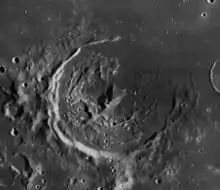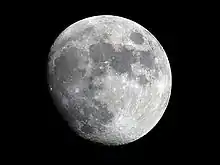Doppelmayer (crater)
Doppelmayer is the remains of a lunar impact crater that lies on the southwest edge of Mare Humorum. It was named after the German mathematician and astronomer Johann Gabriel Doppelmayr.[1] To the south-southeast is another flooded crater designated Lee, and to the southeast is Vitello. Just to the east-northeast of Doppelmayer lies the nearly submerged crater Puiseux.
 Lunar Orbiter 4 image | |
| Coordinates | 28.5°S 41.4°W |
|---|---|
| Diameter | 64 km |
| Depth | 1.6 km |
| Colongitude | 41° at sunrise |
| Eponym | Johann Gabriel Doppelmayr |
The rim of Doppelmayer is nearly round, but is worn and eroded. The most intact section is the southwest half, while in the northeast the rim descends beneath the mare, leaving only a slight rise in the surface. The interior has been flooded by lava, leaving a large raised ridge in the center. A small range of hills curves to the west and north from the southern end of this ridge, forming a feature that is nearly concentric with the crater's outer rim.
Satellite craters
By convention these features are identified on lunar maps by placing the letter on the side of the crater midpoint that is closest to Doppelmayer.
| Doppelmayer | Latitude | Longitude | Diameter |
|---|---|---|---|
| A | 29.8° S | 43.1° W | 10 km |
| B | 30.5° S | 45.4° W | 11 km |
| C | 30.3° S | 44.1° W | 7 km |
| D | 31.8° S | 45.8° W | 9 km |
| G | 28.9° S | 44.9° W | 15 km |
| H | 28.8° S | 43.2° W | 10 km |
| J | 24.5° S | 41.1° W | 6 km |
| K | 24.0° S | 40.7° W | 5 km |
| L | 23.6° S | 40.5° W | 4 km |
| M | 29.5° S | 43.9° W | 15 km |
| N | 29.2° S | 44.6° W | 5 km |
| P | 29.1° S | 42.7° W | 8 km |
| R | 29.2° S | 43.2° W | 4 km |
| S | 28.1° S | 43.6° W | 4 km |
| T | 25.9° S | 43.2° W | 3 km |
| V | 29.8° S | 45.6° W | 8 km |
| W | 33.6° S | 45.6° W | 8 km |
| Y | 33.1° S | 46.1° W | 10 km |
| Z | 33.0° S | 46.4° W | 10 km |
References
- "Doppelmayer (crater)". Gazetteer of Planetary Nomenclature. USGS Astrogeology Research Program.
- Andersson, L. E.; Whitaker, E. A. (1982). NASA Catalogue of Lunar Nomenclature. NASA RP-1097.CS1 maint: ref=harv (link)
- Bussey, B.; Spudis, P. (2004). The Clementine Atlas of the Moon. New York: Cambridge University Press. ISBN 978-0-521-81528-4.CS1 maint: ref=harv (link)
- Cocks, Elijah E.; Cocks, Josiah C. (1995). Who's Who on the Moon: A Biographical Dictionary of Lunar Nomenclature. Tudor Publishers. ISBN 978-0-936389-27-1.CS1 maint: ref=harv (link)
- McDowell, Jonathan (July 15, 2007). "Lunar Nomenclature". Jonathan's Space Report. Retrieved 2007-10-24.CS1 maint: ref=harv (link)
- Menzel, D. H.; Minnaert, M.; Levin, B.; Dollfus, A.; Bell, B. (1971). "Report on Lunar Nomenclature by the Working Group of Commission 17 of the IAU". Space Science Reviews. 12 (2): 136–186. Bibcode:1971SSRv...12..136M. doi:10.1007/BF00171763.
- Moore, Patrick (2001). On the Moon. Sterling Publishing Co. ISBN 978-0-304-35469-6.CS1 maint: ref=harv (link)
- Price, Fred W. (1988). The Moon Observer's Handbook. Cambridge University Press. ISBN 978-0-521-33500-3.CS1 maint: ref=harv (link)
- Rükl, Antonín (1990). Atlas of the Moon. Kalmbach Books. ISBN 978-0-913135-17-4.CS1 maint: ref=harv (link)
- Webb, Rev. T. W. (1962). Celestial Objects for Common Telescopes (6th revised ed.). Dover. ISBN 978-0-486-20917-3.CS1 maint: ref=harv (link)
- Whitaker, Ewen A. (1999). Mapping and Naming the Moon. Cambridge University Press. ISBN 978-0-521-62248-6.CS1 maint: ref=harv (link)
- Wlasuk, Peter T. (2000). Observing the Moon. Springer. ISBN 978-1-85233-193-1.CS1 maint: ref=harv (link)
| Wikimedia Commons has media related to Doppelmayer (crater). |
